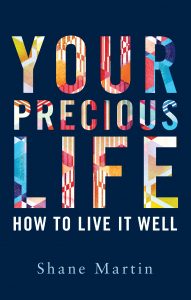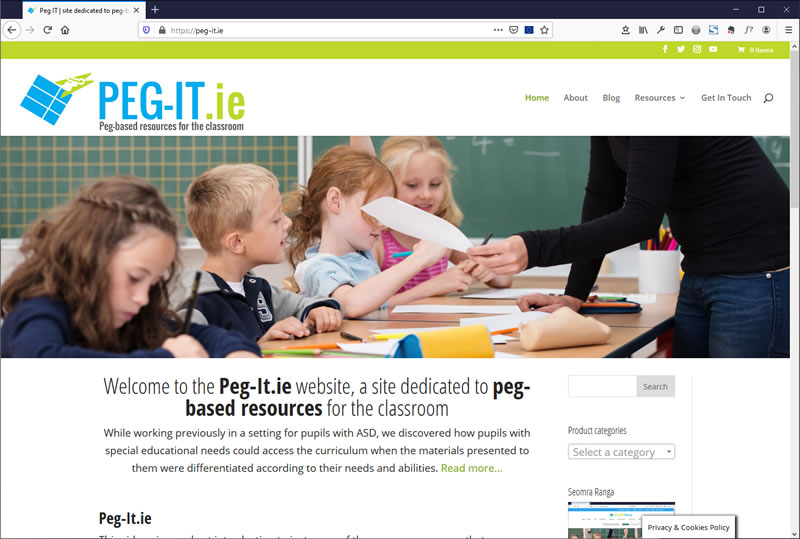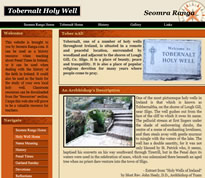 Having previously heard Shane Martin speak at an event, and having been really impressed with his presentation style as well as the message he was delivering, I was really interested when I found out that he was publishing a new book.
Having previously heard Shane Martin speak at an event, and having been really impressed with his presentation style as well as the message he was delivering, I was really interested when I found out that he was publishing a new book.
Having started off his professional life as a secondary school teacher, Shane subsequently trained as a psychologist. Shane is well acquainted with the field of education and travels the country delivering talks in schools on a variety of topics. He also runs the Moodwatchers website. (His Moodwatchers Facebook Page is also worth a follow)
In his book, “Your Precious Life – How To Live It Well“, Martin argues that because we only live this life once, it is a precious life and we are entitled to live the best life possible. The book comes from the “positive psychology” school of thought – whereby the emphasis is on what keeps us mentally well, healthy and happy. He believes that “psychology can offer pathways to help us stay strong as well as understand why we become weak.
Martin offers “evidence-based and scientifically validated strategies to experience greater fulfilment” in our lives. He includes many stories and anecdotes to illustrate the strategies that he is proposing, as well as citing relevant studies and experts. As I read the book, I found that there were many hints and tips about mental health and wellbeing that were equally applicable to us both as people and as teachers.
In a section called “Teaching Children the Skills of Rational Thinking“, he argues that there is “huge potential to curb tension and possibly prevent some emotional explosions” by teachers promoting the idea of rational thinking in schools.
In the book, Martin also explains the importance of “Flow” in our lives, both at home and in the workplace. He argues that the concept of “flow” should be of particular interest and relevance to teachers.
“Teacher training should incorporate strategies for cultivating an engaged learning experience in the classroom – and offer ways to increase flow within the whole school experience.”
He argues that for “flow” in the classroom to occur, it is critical for teachers to bear it in mind when preparing lesson plans. He believes that pupils need to be challenged, depending on their level of ability, in order for them to experience flow in the classroom. He also believes that a lack of flow experience in school may be “at the heart of what is perceived as disruptive behaviour”.
There’s a chapter devoted to “Cultivating Compassion” in which Martin argues that kindness not only is a good thing to do but that it is also good for you. He’s direct when he says:
“Sometimes we want exclusive rights to stress. We can convince ourselves that we have the worst problems in the world. Helping others not only protects us from becoming self-obsessed but can also be a great help to ourselves in contextualising our own problems.”
Of particular interest to teachers, Martin argues that cultivating compassion and a “compassionate ethos” in schools is really important. Where pupils display acts of kindness, he believes that such acts need to be both affirmed by teachers and also fostered within the home.
There’s also a chapter on “Practising Gratitude”. “Gratitude”, Martin says, “is a deep appreciation for what you receive, whether tangible or not”. He says that expressions of gratitude to people, for example teachers or nurses, affirms and encourages them in their work. He says that we also need to express gratitude for the positive things in our lives. He recommends a “count your blessings” exercise before you go to sleep where you focus on the positive aspects of your day and take them to sleep with you.
Although I’ve only touched on aspects of the book in this article, and although I haven’t quite finished it yet, it’s fair to say that I’ve been really impressed by it. It has a great mix of scientific theory, stories, anecdotes, hints and tips to bring about a more positive outlook for people and their mental health. Although teachers are not the sole target audience for the book, I feel that many teachers will take lots of practical ideas from it.
It’s not surprising that the book sold well after it was first published in the autumn and it became difficult to find copies in bookstores. However, it should now be available in Easons, Veritas and most good bookstores, priced at €12.95. Published by Orpen Press, it’s also available on Amazon and Kindle.





